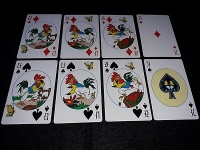| Site Notice |
|---|
|
Difference between revisions of "Playing cards (Korean)"
Jump to navigation
Jump to search
Torchickens (talk | contribs) |
Torchickens (talk | contribs) (→Butterfly and Rooster) |
||
| Line 3: | Line 3: | ||
These are classic early [[Nintendo]] [[playing card]]s for the Korean market. | These are classic early [[Nintendo]] [[playing card]]s for the Korean market. | ||
| − | ==Butterfly and | + | ==Butterfly and rooster== |
The cards come in a black case with "Nintendo Co., Ltd." on the back. On the back of each card is some Japanese style/wafuu artwork of white flowers on a red background. | The cards come in a black case with "Nintendo Co., Ltd." on the back. On the back of each card is some Japanese style/wafuu artwork of white flowers on a red background. | ||
Latest revision as of 22:16, 30 November 2022
These are classic early Nintendo playing cards for the Korean market.
Butterfly and rooster
The cards come in a black case with "Nintendo Co., Ltd." on the back. On the back of each card is some Japanese style/wafuu artwork of white flowers on a red background.
List:
- A butterfly archer shoots at a rooster drowning in the water.
- A female butterfly on top of a red flower/water lily.
- Butterfly spade card
- Regular "2"-"10 spade cards
- Spade: A running rooster at the edge of a cliff. A butterfly is in the background (two spade variations, one clover, one diamond, one heart).
- A rooster blinking touching his face next to a fence; a male butterfly is watching (spade, heart, clover, diamond variations).
- Regular heart card
- Heart cards 2-10
- Frightened rooster in a flower field, butterfly watching (clover, diamond)
- Diamond card
- Diamond card 2-10
- Clover card
- Clover card 2-10
| This article is a stub. You can help NintendoWiki by expanding it. |
